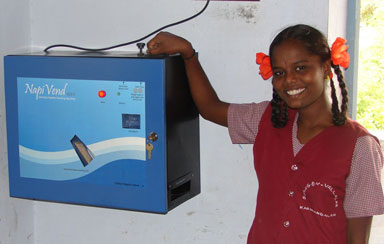 LUCKNOW: Amid concern over high dropout rate of girls because of menstrual hygiene issues, a women’s college here has shown the way by becoming the first institution in Uttar Pradesh to install a sanitary napkin vending machine on its premises.
LUCKNOW: Amid concern over high dropout rate of girls because of menstrual hygiene issues, a women’s college here has shown the way by becoming the first institution in Uttar Pradesh to install a sanitary napkin vending machine on its premises.
Unavailability of sanitary pads, absence of separate toilets for girls and lack of water in toilets reflect on the attendance of girls in schools and colleges and surveys have claimed that nearly 20 to 30 per cent of girls in North India dropped out of schools after they started menstruating.
While talking about menstrual hygiene remains a taboo in the country, the “bold step” of installing an automated sanitary vending machine for its students has been taken by one of the prestigious and oldest women’s colleges – the Avadh Girl’s Degree College under Lucknow University.
“We installed the machine around a week back and response from the students is very good,” AGDC Manager Nishi Pandey told PTI.
Pandey said the students are being charged Rs 10 a piece.
“In fact we are also considering installing a disposal machine as well, as the pads are not disposed of hygienically,” she said.
Pandey, who also teaches in Lucknow University, said a similar unit was being planned for the Department of English and the girls’ common room in LU.
“We have received the proposal and are awaiting approval of the Vice-Chancellor,” she said, adding that at least one machine would be installed in the girls’ common room in LU.
In north India, over 30 per cent of girls interviewed said they dropped out of school after they started menstruating, says a study by AC Nielsen on “Sanitary Protection: Every Woman’s Health Right”.
Inadequate menstrual protection makes adolescent girls (age group 12-18 years) miss five days of school in a month (50 days a year). Around 23 per cent of these girls actually drop out of school after they started menstruating.
Only 12 per cent of Indian women use sanitary napkins while others are at risk of health problems.
The UP government had last year decided to distribute sanitary napkins free of cost to girls studying in government schools from class 6 to class 12 at a cost of Rs 19.74 crore to the state exchequer.
Earlier this year, Chief Minister Akhilesh Yadav had directed all the district magistrates in the state to ensure steps for addressing menstrual hygiene issues and asked them to promote manufacture and distribution of low cost sanitary napkins in their respective districts.
In a letter addressed to Chief Secretary Alok Ranjan, the Chief Minister instructed that since the matter was associated with health, dignity and empowerment of women, it should be taken seriously at all levels. The direction came close on the heels of reports suggesting that an alarming 28 lakh adolescent girls in the state miss school every month, while over 19 lakh eventually quit education because of menstruation.
“Poor menstrual hygiene gives rise to infection in women. If DMs took interest in the issue, they would be able to fight with the age-old mindset and myths regarding health of young women,” the CM said in the letter.
Poor menstrual hygiene is one of the major reasons for the high incidence of reproductive tract infections and one of causes for high dropout rate of girls.
“In schools, there is no privacy to change when required and the girls feel hesitant to seek permission to go home,” said founder of Sulabh Sanitation Movement Bindeshwar Pathak.
Pathak said despite its far-reaching impact on education and health for girls, menstruation, is a taboo topic. Just the word, even when spoken in hushed tones, is treated with shame and disgust. “This has to change,” he said.
To improve personal hygiene among adolescent girls, Sulabh International has decided to set up a sanitary napkin unit in Odisha.-PTI






